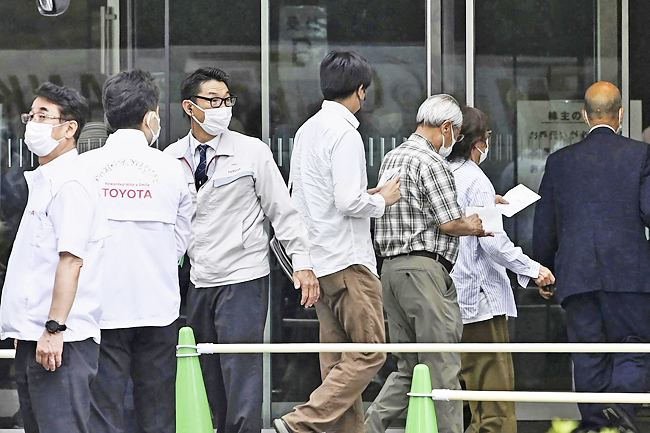TOYOTA, JAPAN (AP) – Toyota executives fielded challenges and reaped praise from investors at an annual general meeting yesterday where shareholders ultimately rejected demands the automaker do better on fighting climate change. The investor proposal was initiated by AkademikerPension, a USD20 billion Danish investment fund.
It accused Toyota Motor Corp of lobbying to weaken efforts by governments around the world to phase out the internal combustion engine. Shareholders applauded in rejecting the proposal, as expected, at the meeting in Toyota city, central Japan.
The majority of Toyota shares are held by the company and its group companies, retired employees and others sympathetic to the company’s perspective.
The shareholders’ proposal challenged the reappointment of Toyota’s Chairman Akio Toyoda, grandson of the company founder and a board director, arguing the company has lagged in keeping up with the global shift to battery electric vehicles (EVs).
Toyoda and other company officials defended their green record, noting Toyota is aiming for carbon neutrality, or net-zero carbon emissions, in its lineup by 2050.
The resolution filed by the Danish fund was also supported by Norwegian financial services company Storebrand Asset Management and a Dutch pension investment company, APG Asset Management. “From an investment perspective, we’re concerned that Toyota is missing out on profits from soaring EV sales, jeopardising its valuable brand and cementing its global laggard status,” CIO at the Danish fund Anders Schelde, said in a statement ahead of the meeting.

Others behind the proposal said Toyota needs to live up to its commitment to the Paris Agreement, an international treaty to reduce greenhouse emissions.
Toyota officials stressed that instead of just focussing on battery EV the company was pursuing “multi pathways”, or various energy options, including hybrids, plug-ins and hydrogen-powered vehicles.
“Various options need to be readied,” said one of the executives Masahiro Yamamoto.
“What is important is to better convey our efforts to all shareholders.”
President Koji Sato, who has acknowledged Toyota has fallen behind in battery EVs and must play catchup, tried to assure shareholders the company is working hard to “move people’s hearts”, based on a team-oriented style of management.
Toyota’s latest environmental initiatives include the development of the all-solid-state battery for EVs by as early as 2027.
Major United States (US) pensions were also behind the climate change proposal, including the New York City Comptroller’s Office and the California Public Employees’ Retirement System.






